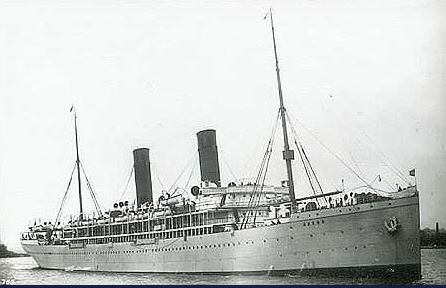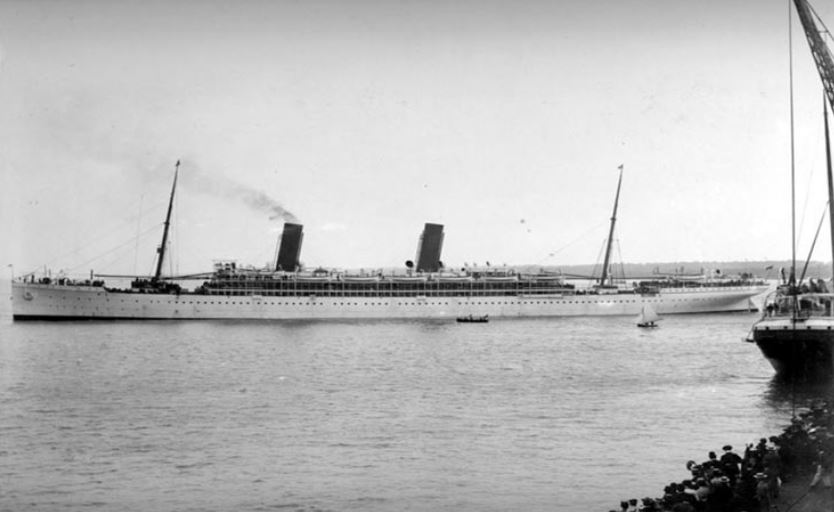Difference between revisions of "SS Saxon"
From Our Contribution
| (16 intermediate revisions by the same user not shown) | |||
| Line 1: | Line 1: | ||
| − | {{Infobox | + | {{Infobox ship |
| − | | | + | | image = [[File:SS_Saxon.jpg|border|]] |
| − | |||
| − | |||
| − | |||
| − | |||
| − | |||
| − | |||
| caption = | | caption = | ||
| − | | | + | | image2 = [[File:SS_Saxon_1.jpg|border|]] |
| caption2 = | | caption2 = | ||
| + | | shipname = SS Saxon | ||
| + | | shipowner = Union Castle Steamship Co. | ||
| + | | shipbuilder = Harland & Wolff, Belfast | ||
| + | | shipyardnumber = 326 | ||
| + | | shiplaunched = 21 Dec 1899 | ||
| + | | shipcompleted = 9 Jun 1900 | ||
| + | | shipinservice = 16 Jun 1900 | ||
| + | | shipoutofservice = 1935 | ||
| + | | shipinservice2 = | ||
| + | | shipoutofservice2 = | ||
| + | | shipreclassified = | ||
| + | | shipID = | ||
| + | | shipfate = scrapped at Blyth 1935 | ||
| + | | shiptype = Passenger / cargo | ||
| + | | shiptonnage = 12,385 tons | ||
| + | | shiplength = 570.5 ft (173.74m) | ||
| + | | shipbeam = 64.4 ft (19.51m) | ||
| + | | shipdepth = 38.6 ft | ||
| + | | shippropulsion = twin screw | ||
| + | | shipspeed = 17.5 knots (32.41 km/h) | ||
| + | | shipcapacity = 310 x 1st; 203 x 2nd; 132 x 3rd; & 154 steerage | ||
| + | }} | ||
| − | |||
| − | |||
| − | |||
| − | + | ==Remarks== | |
| − | + | Originally ordered by the Union Steam Shipping Co, she was sold while being fitted out to the Union-Castle Mail Steam Shipping Co. and Used on the UK-South Africa route. In August 1902 she arrived at Southampton with three Boer Generals, Botha, de la Ray and de Wet, the Boer War having ended on 31st May with the establishment of three Boer republics within the British Empire. | |
| − | |||
| − | |||
| − | |||
| − | |||
| − | |||
| − | |||
| − | |||
| − | + | During World War I ''Saxon'' remained on commercial service, although her third-class was devoted to troop-carrying on occasion. (Since Southampton had become a military port when the war began, Saxon's British terminus was moved to London.) From 1917 on, she was used full-time for trooping, primarily in the Mediterranean, ferrying troops between Alexandria and Marseilles. After the Armistice she repatriated Australian troops before being refitted for passenger service again. | |
| − | |||
| − | |||
| − | |||
| − | + | Saxon resumed her Union-Castle service in 1919, and remained on the mail service through 1930. She made her final sailing on the intermediate service in January 1931 and was then laid up as a "reserve" ship. She was scrapped at Blyth in 1935, the last survivor of the Union Line fleet. | |
| − | |||
| − | |||
| − | |||
| − | |||
| − | |||
| − | == | + | ==Soldiers carried== |
| − | [[Arthur Percy Thomas Boyle]] | + | ===England to Port Melbourne 11 December 1918 - 31 January 1919=== |
| + | * [[Arthur Percy Thomas Boyle]] | ||
| + | * [[Walter Robert Hayes]] | ||
| + | * [[Henry McCavana]] disembarked in Fremantle 20 January | ||
| + | * [[William Richard (Billy) Orr]] | ||
| + | * [[Frederick Robert Weedon]] disembarked in Fremantle 20 January | ||
[[Category:Ships]] | [[Category:Ships]] | ||
Latest revision as of 01:15, 25 September 2023
Remarks
Originally ordered by the Union Steam Shipping Co, she was sold while being fitted out to the Union-Castle Mail Steam Shipping Co. and Used on the UK-South Africa route. In August 1902 she arrived at Southampton with three Boer Generals, Botha, de la Ray and de Wet, the Boer War having ended on 31st May with the establishment of three Boer republics within the British Empire.
During World War I Saxon remained on commercial service, although her third-class was devoted to troop-carrying on occasion. (Since Southampton had become a military port when the war began, Saxon's British terminus was moved to London.) From 1917 on, she was used full-time for trooping, primarily in the Mediterranean, ferrying troops between Alexandria and Marseilles. After the Armistice she repatriated Australian troops before being refitted for passenger service again.
Saxon resumed her Union-Castle service in 1919, and remained on the mail service through 1930. She made her final sailing on the intermediate service in January 1931 and was then laid up as a "reserve" ship. She was scrapped at Blyth in 1935, the last survivor of the Union Line fleet.
Soldiers carried
England to Port Melbourne 11 December 1918 - 31 January 1919
- Arthur Percy Thomas Boyle
- Walter Robert Hayes
- Henry McCavana disembarked in Fremantle 20 January
- William Richard (Billy) Orr
- Frederick Robert Weedon disembarked in Fremantle 20 January

